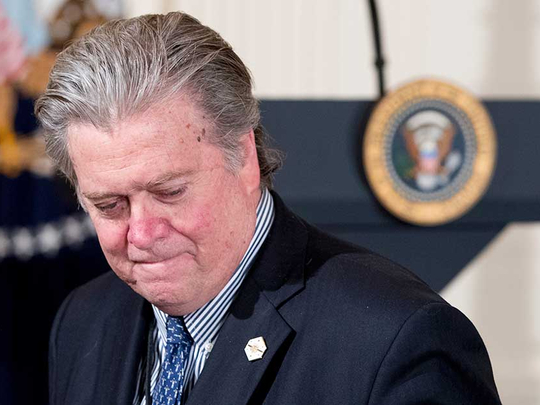
White House chief strategist Stephen K. Bannon’s departure was widely applauded, and not only by the Washington establishment Bannon has spent a career excoriating. After the news broke, traders at the New York Stock Exchange “literally cheered,” according to a CNBC report.
Yet the reaction was not uniformly positive. Supporters of President Donald Trump’s America First nationalism worried that Bannon’s exit might sever the ties between the president and his electoral base. But Trump’s supporters are wrong to worry. Bannon is the latest in a long line of political advisers whose reputations are inflated after an election victory. Bannon may have given much thought to traditionalism and populism, may have publicised its themes as chairman of Breitbart.com, may be able to name drop Rene GuEnon, Julius Evola, Jean Raspail, Neil Howe and William Strauss. But Trump’s inflammatory response to the clashes and killing recently in Charlottesville, Virginia, made it clear that it is he, and not Bannon, who maintains a gut connection with his most diehard supporters. Bannon’s reputation is overrated. Yes, he transformed Breitbart from an irreverent blog into the iconoclastic tribune of nation-state populism, the anti-elitist ideology of border walls, travel bans and political incorrectness.
But his career as a political consultant has been short and checkered. As the president has observed, Bannon did not join Trump’s campaign until last August, by which time Trump had secured the Republican nomination. Trump’s general election victory was remarkable. It was also something of a black-swan event. There is a tendency, especially among Trump’s supporters, to overlook the fact that, had some 79,000 votes in three states gone the other way, the winner of the popular vote would now be in the White House. Since his inauguration, Trump’s numbers have steadily declined. He is at 39 per cent approval and at 55 per cent disapproval in the Real Clear Politics average of polls. The low standing depletes Trump’s political capital and his leverage over Congress. It endangers Republican control of one or both legislative chambers. Perhaps it is time to take advice from someone else.
Of course, Trump does not seem inclined to listen to anyone at all. That is even more reason not to exaggerate Bannon’s influence. Bannon may have encouraged Trump to follow his instincts, but that is precisely the point: Trump’s natural inclinations are in perfect harmony with the voters he refers to in casual conversation as “my people.” Bannon may have encouraged Trump not to back down from his positions on the violence in Charlottesville and on the place of statuary memorialising the Confederacy. But the final decision, like all decisions in this White House, was Trump’s alone.
Bannon has flitted through an eccentric career in the Navy, on Wall Street, in Hollywood and in the populist faction of the conservative movement. He has a reputation as a well-read autodidact whose syncretic worldview is the result of years of independent and wide-ranging study. But he is a terrible colleague. His unprompted interview last week with the editor of a liberal magazine not only demonstrated a naive willingness to forge alliances with the economic left on trade and infrastructure. It also confirmed everything that has been said about Bannon: He disparages his co-workers behind their backs; he postures as the force behind personnel decisions; and he pretends to know more about national security than James Mattis, John Kelly, H.R. McMaster and Joseph Dunford (not to mention Donald Trump).The myth of Steve Bannon’s power may live on. But the reality is that Trump no longer needs him and is unlikely to be harmed by Bannon’s sniping. The connection between Trump and the forces Bannon represents is visceral and durable. To save his presidency, though, Trump must join with another, far larger constituency: the American people.
—New York Times News Service
Matthew Continetti is an American conservative journalist and columnist.










